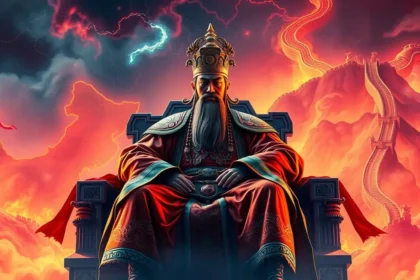Nationalism, a concept so deeply ingrained in the modern geopolitical landscape, has transformed how societies perceive identity, allegiance, and power. Far from being an innate aspect of human culture, nationalism is a relatively recent invention—a social construct shaped by history, politics, and technological progress. This article explores the roots of nationalism, its global influence, and the challenges it presents today.
Nationalism is an imagined political community, constructed through shared history and identity, rather than a natural aspect of human existence.
Benedict Anderson
The concept of nationalism developed as societies evolved, often coinciding with moments of profound political and technological change. It redefined identities, linking people to nations rather than localities or dynasties. The rise of nationalism was driven by events like the French Revolution and industrialization, which created new connections among diverse populations. Education systems, transportation networks, and mass communication were crucial in unifying fragmented communities under shared national myths. However, nationalism also introduced challenges, including ethnic divisions and exclusion, making it a complex and multifaceted force in shaping the modern world.
The Origins of Nationalism: A Construct of Modernity
Before the 19th century, most people identified themselves with local communities, religions, or kinship groups rather than nations. In pre-revolutionary France, for example, subjects of the Kingdom of France identified more with their villages or linguistic groups than as “French.” The modern idea of a unified nation-state emerged gradually, driven by significant historical and political shifts.

Napoleon and the Rise of National Identity
The French Revolution and Napoleon Bonaparte’s reign were pivotal in forging the concept of nationalism. Napoleon’s self-coronation in 1804 symbolized a break from allegiance to religious or dynastic rulers, transferring loyalty to the abstract idea of a nation. This shift was monumental, as it redefined governance and citizenship by emphasizing the collective identity of people rather than the authority of kings or popes.
Napoleon’s campaigns also exported nationalism across Europe, laying the groundwork for future nation-states. The revolutions of the 19th century, such as those in Italy and Germany, were inspired by this model, leading to waves of wars of independence and unification.
The Role of Industrialization and Urbanization
Industrialization played a crucial role in transforming fragmented identities into cohesive national ones. In France, railroads physically connected regions, while urbanization brought people from diverse linguistic and cultural backgrounds into closer contact. These interactions fostered a shared identity, blending regional distinctions into a broader national consciousness.
Mass education further solidified nationalism. Schools taught standardized languages, history, and patriotic narratives, framing the nation as eternal and unchanging. These efforts were mirrored in other countries, such as Italy, where unification in 1861 required significant cultural integration. Despite official unification, many Italians still identified with their local regions, highlighting the complexities of building a national identity.
In France, these measures created a unified sense of “Frenchness,” erasing local allegiances tied to villages or dialects. Similarly, in Italy, the state sought to unify a population deeply fragmented by regionalism after its official unification in 1861. However, this process faced resistance as local cultures and dialects persisted.
Urbanization added another layer to this dynamic. Cities became melting pots where regional distinctions began to blur. Shared struggles in industrial workplaces and new social movements further strengthened bonds across disparate groups, aligning their identities with national aspirations.
Nonetheless, these efforts often encountered challenges. Regional disparities and entrenched local loyalties proved resilient, underscoring the complexities of forging national unity. These tensions highlighted that while industrialization and urbanization could foster a broader national identity, they were not always sufficient to completely erase the diverse and deeply rooted local cultures that characterized pre-modern societies.
Nationalism’s Global Expansion
The spread of nationalism beyond Europe was facilitated by technological advancements like railways and mass media. These innovations enabled the dissemination of nationalist ideologies, reshaping societies across Asia, Africa, and the Americas. Colonized regions adopted National identity to resist imperial powers, leading to movements for independence and self-determination.

However, the imposition of artificial borders by colonial powers often ignored ethnic and cultural realities, sowing the seeds of future conflicts. In Africa and the Middle East, for example, arbitrary boundaries created by colonial agreements forced diverse groups into single political entities, resulting in ethnic tensions that persist today.
The Dark Side of Nationalism
While nationalism has unified and empowered many societies, it also has a darker side. By defining the nation in terms of a dominant ethnic or cultural identity, National identity can marginalize minorities and fuel discrimination. The 20th century witnessed the rise of ultra-nationalism, which led to devastating consequences, including the Holocaust and ethnic cleansings in the Balkans and Rwanda.
Nationalism can inspire unity but also fuels division, exclusion, and conflict, challenging the ideals of coexistence.
Timothy Snyder
Borders, often seen as immutable, are arbitrary constructs that have historically shifted with the rise and fall of empires. Yet, National identity tends to frame these boundaries as sacred, reinforcing divisions and perpetuating conflicts over territorial claims.
Alternative Identities: Cosmopolitanism and Local Communities
In response to the limitations of National identity , alternative sources of identity have emerged. Cosmopolitanism, which emphasizes global citizenship and shared humanity, offers a vision of belonging beyond national borders. Urbanization and globalization have also created hybrid identities, where individuals connect with diverse cultures and communities.

Local identities, rooted in shared history and traditions, continue to thrive alongside National identity . These identities can coexist with broader allegiances, offering a more nuanced understanding of belonging.
The Future of Nationalism: Evolving or Enduring?
As globalization continues to shape the modern world, National identity stands at a crossroads, adapting to new challenges while grappling with its inherent limitations. Global crises like climate change, migration, and pandemics emphasize the need for collective action, raising questions about nationalism’s ability to evolve into a cooperative and inclusive framework.
Challenges and Opportunities
- Global Collaboration vs. Sovereignty: The tension between national sovereignty and the need for international cooperation is evident in issues like environmental agreements or refugee crises. For National identity to endure, it may need to embrace hybrid forms that allow for global collaboration without losing local identities.
- Technological Impacts: The digital age is reshaping how people connect, enabling cross-border communities that challenge traditional nationalism. However, technology also amplifies ultra-nationalistic sentiments, creating new arenas for ideological conflict.
Psychological Underpinnings
- Belonging and Unity: Nationalism thrives on creating a shared identity, fostering loyalty and pride among citizens. This sense of unity is often reinforced during times of external threat or internal strife.
- Divisive Dynamics: Nationalism’s “us vs. them” mentality, while unifying for some, risks marginalizing others and perpetuating global divisions.
Possible Futures
- Inclusive Nationalism: A reimagined form of nationalism could prioritize diversity and global solidarity while maintaining local pride.
- Resistance to Change: Rigid nationalism may deepen global isolation, emphasizing exclusivity at the expense of cooperation.
The future of nationalism will depend on its ability to adapt and remain relevant in a world increasingly defined by interconnectedness. Its evolution offers both hope and challenges for shaping a unified yet diverse global community.
Final Thoughts: The Dual Nature of Nationalism
Nationalism remains a powerful force in shaping the modern world, influencing everything from international relations to individual identities. Its ability to unite and inspire is undeniable, yet its potential for exclusion and conflict cannot be ignored. Understanding nationalism’s historical roots and its impact on geopolitics is crucial for addressing the challenges of a rapidly changing world.
In reflecting on the evolution of nationalism, we must consider how it might adapt to foster a more inclusive and cooperative global community. The question remains: Can nationalism evolve into a force for unity in diversity, or will it continue to emphasize the divisions that define our world today?
By examining its history and implications, we can better navigate the complexities of a world where identities and allegiances are constantly in flux.
Must Read : Welcome to FebruarytoEnd









